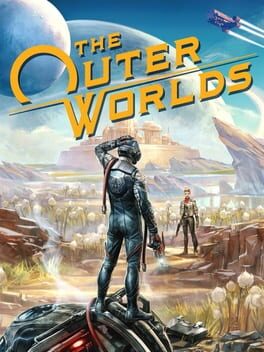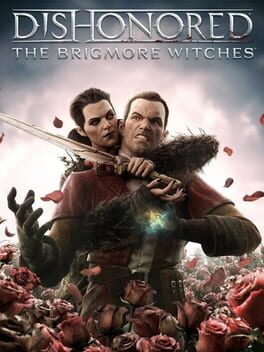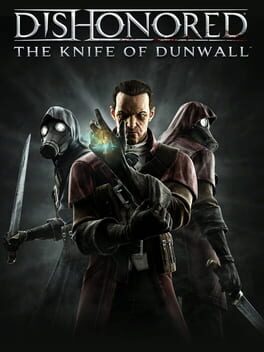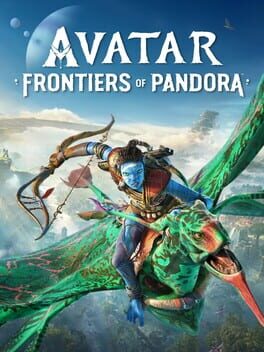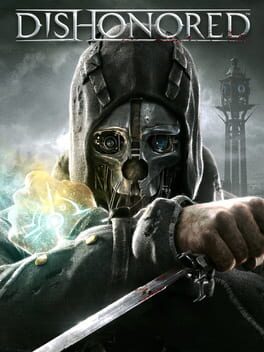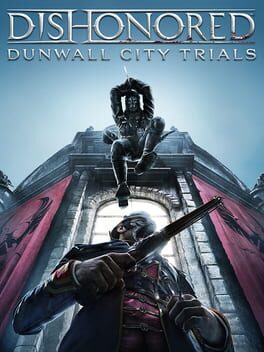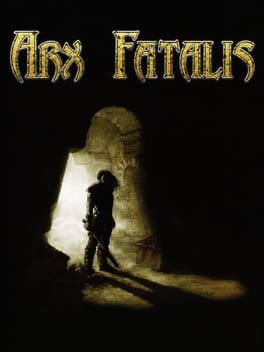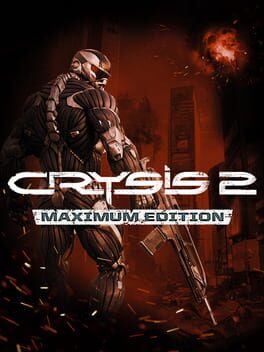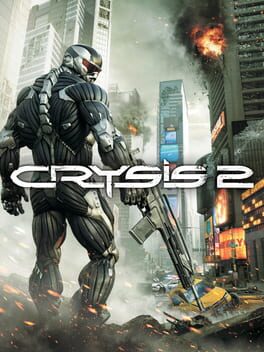111 Reviews liked by NickNotFound
The Outer Worlds
2019
The one thing I never expected an Obsidian game to be was terminally uninteresting but that's exactly what The Outer Worlds is. A collection of shallow systems, characters, and quests that sort of affect the illusion of a proper RPG with depth and consequence but in reality offers nothing of the sort.
The almost cartoonish lack of depth in the gameplay is mirrored in the story, which is a smarmy and infuriatingly smug monument to Enlightened Centrism that wraps itself in a veneer of anti-capitalist rhetoric so thin that it would struggle to appear meaningfully leftist even to someone who gets all their political opinions from Breadtube. Faux-empathetic South Park politics for the Rick and Morty generation, where picking an actual side is always fucking stupid and you should always strive for a meaningless compromise in order to preserve the status quo.
Genuinely astonishing that this came from the same studio that released Pillars 2 just prior, a game that, for all it's issues, actually had the guts to grab you by the neck and tell you to pick a fucking side, to get some god damn ideology, and actually let you meaningfully change the broken world it presented. That game was the real New Vegas 2 you've all been clamouring for, but no one bought it, so I guess we're stuck with this.
Nothing else to really say because there's basically nothing else in here. An utterly empty and vacuous game that doesn't even manage to surpass Fallout 4. A snake oil salesman promising you a miracle solution to bring back the Fallout you remember, but get past the fancy logo and uncork that bottle, and you'll find nothing in there but dust and echoes.
The almost cartoonish lack of depth in the gameplay is mirrored in the story, which is a smarmy and infuriatingly smug monument to Enlightened Centrism that wraps itself in a veneer of anti-capitalist rhetoric so thin that it would struggle to appear meaningfully leftist even to someone who gets all their political opinions from Breadtube. Faux-empathetic South Park politics for the Rick and Morty generation, where picking an actual side is always fucking stupid and you should always strive for a meaningless compromise in order to preserve the status quo.
Genuinely astonishing that this came from the same studio that released Pillars 2 just prior, a game that, for all it's issues, actually had the guts to grab you by the neck and tell you to pick a fucking side, to get some god damn ideology, and actually let you meaningfully change the broken world it presented. That game was the real New Vegas 2 you've all been clamouring for, but no one bought it, so I guess we're stuck with this.
Nothing else to really say because there's basically nothing else in here. An utterly empty and vacuous game that doesn't even manage to surpass Fallout 4. A snake oil salesman promising you a miracle solution to bring back the Fallout you remember, but get past the fancy logo and uncork that bottle, and you'll find nothing in there but dust and echoes.
The Outer Worlds
2019
The Outer Worlds
2019
The first part of this DLC is one of my favorite missions in all of Dishonored. But then the last part is easily my least favorite mission in all of dishonored. It's just a reused level from the base game and it kinda pushes you towards high chaos unless you want immense ass pain trying for anything else. Still, this is a damn fine DLC and I fucking love Michael Madsen as Daud, so more Daud is always good.
Me gustaría poder recomendarlo pero tras 5h de juego la historia apenas había avanzado y ya me había cansado de dar vueltas por un mapa con muchos campamentos y pocas cosas realmente interesantes que hacer. Opinión más extensa https://www.youtube.com/watch?v=X_28QRAVs8k&t=62s
Dishonored
2012
Dishonored’s chaos system fascinates me. On the surface it’s a basic kill-counter, where actually using the fun lethal magic is punished with increased guard counts and a pessimistic ending, and this naturally rubbed a lot of people the wrong way. When given the ability to stop time, what people want to do is take down an entire squad all at once, queue up ten projectiles for when time resumes, move someone back down the stairs, and so on, not just sneaking past one particularly stubborn guard. When given the ability to summon a devouring swarm of rats, the idea isn’t to possess one and sneak it into a drain pipe, it’s to make an explosive and terrifying entrance. Dampening that enjoyment with negative consequences seems like an unambiguously bad move, but the narrative framing that surrounds it leads into an analytical hall of mirrors. These powers are granted by the Outsider, a manifestation of the indefinable void, and their reasons aren’t very clear. They state that it’s because our protagonist is interesting, and they’re curious of what will be done with these newfound abilities. Just as the Outsider grants Corvo powers and a burden of choice, so too does the designer give them to the player, which, to a degree, lets us correlate the ideals of the two. To craft these levels with smart patrol routes, entry points, optional objectives, and bonus dialog takes a ton of effort, so the hope was that players wouldn’t choose to miss that content. While they made it possible to do so, they don’t actually want players to walk in the front door, shoot everyone in sight, and finish the game thoughtlessly in two hours, so some level of punishment was implemented. Similarly, the hope of the Outsider is that Corvo isn’t going to be boring, he won’t just give in to his base lust for revenge, and will instead give some insight on the nature of humanity. Once the uninteresting aggression has been pared off, the choice is then between taking out the high-priority targets lethally or non-lethally, and this where the situation actually becomes nuanced. All of the non-lethal, low-chaos options for eliminating targets are arguably worse than death: being branded with a hot iron and cast into a plague-infested city, being worked to death in a mine, kidnapped by an obsessive stalker, or put up for the same kind of public execution Corvo was originally destined for. The optional dialog in each mission really hammers home just how horrible things will be for those who receive your mercy, with the same overseers who mention the heretic’s brand being the same ones who reveal its horrible implications, and the prophesying heart making it clear that the spared Lady Boyle will soon die in abject poverty thanks to your beneficence. I believe this is the dilemma that the Outsider, as a being outside mortality and time, wants to see. Corvo himself was almost executed outside the law, but now he has all the power in the world and nothing to lose. What perspective on life and death does that give a person? Would he see even the most brutal rat-swarm death as justice, and maybe even merciful compared to the torturous and prolonged alternative? How much is mere existence worth?
However, that perspective rests upon the ever-shaky foundation of determining the developer’s intent, and it’s questionable how much of this is simply overanalysis. After all, every one of those horrible non-lethal options contribute to the low-chaos ending, with its bright skies and optimism. What could have been a dilemma worthy of the Outsider’s interest, one with no right answers, ends up as a right-and-wrong binary choice. This might be another example of the full-lethality problem, where the developers wanted players to have a choice, but had to associate some options with punishment to force players into thinking. With this, we arrive at Dishonored’s infinite mirror, of asking why players are given a choice if one option is almost objectively inferior, which can be answered with the idea that this effect is deeply woven into the narrative, which can in turn be questioned when it means interesting dilemmas are made into binary choices with inferior options, and so on, to infinity.
To be honest, I don’t know what my takeaway about Dishonored’s chaos system and its story really is. On one hand, I love that I get to question these things, but on the other, I wonder if its choices being blandly sorted into high or low chaos was just a cynical move, an anticipation that players might not pick up on the worldbuilding details and say there was no point to it all. Giving the murderous players a dark and stormy final level was considered the best way to show that the world was reacting to their choices; non-lethality had to be rewarded with smiles and sunny days, the feeling of being patronized is inescapable. That sneaky bitterness of cynicism is about the only thing that keeps me from really adoring the game, since it does everything else so beautifully, the world is so unique and interesting, the levels intricate and the powers satisfying, it’s the exact sort of originality I love to see. I just wish I could be confident that the game thought as highly of me as I do of it.
However, that perspective rests upon the ever-shaky foundation of determining the developer’s intent, and it’s questionable how much of this is simply overanalysis. After all, every one of those horrible non-lethal options contribute to the low-chaos ending, with its bright skies and optimism. What could have been a dilemma worthy of the Outsider’s interest, one with no right answers, ends up as a right-and-wrong binary choice. This might be another example of the full-lethality problem, where the developers wanted players to have a choice, but had to associate some options with punishment to force players into thinking. With this, we arrive at Dishonored’s infinite mirror, of asking why players are given a choice if one option is almost objectively inferior, which can be answered with the idea that this effect is deeply woven into the narrative, which can in turn be questioned when it means interesting dilemmas are made into binary choices with inferior options, and so on, to infinity.
To be honest, I don’t know what my takeaway about Dishonored’s chaos system and its story really is. On one hand, I love that I get to question these things, but on the other, I wonder if its choices being blandly sorted into high or low chaos was just a cynical move, an anticipation that players might not pick up on the worldbuilding details and say there was no point to it all. Giving the murderous players a dark and stormy final level was considered the best way to show that the world was reacting to their choices; non-lethality had to be rewarded with smiles and sunny days, the feeling of being patronized is inescapable. That sneaky bitterness of cynicism is about the only thing that keeps me from really adoring the game, since it does everything else so beautifully, the world is so unique and interesting, the levels intricate and the powers satisfying, it’s the exact sort of originality I love to see. I just wish I could be confident that the game thought as highly of me as I do of it.
When I began playing this dlc, steam reviews said "Mostly Negative"
"Woah! Is this some kind of buggy mess?" is what I first thought so I was pleased to see it wasn't the case when I played it.
This dlc features 10 challenges ranging from stealth scenarios, combat and mobility "trials".
I don't think they're bad, but they're definitely not amazing either. You can beat this dlc in under two hours, getting all the achievements.
A lot of people REALLY hate the achievements introduced here, specially the scoring related achievements due to the challenges asking for the same amount of score to get three stars and of course not all of them are balanced around that so it is a bit of a struggle, an unfun one aswell.
I feel like the stealth scenarios are the best. If you enjoy the combat, the combat scenarios are also really good and interesting, but the mobility trials are... kind of clunky. The only good one being the train one.
This dlc is just unremarkable. The reason why it's "mostly negative" is simply because we all think "Do we recommend it?" No, we don't. It's not a bad dlc, it just doesn't add anything to Dishonored and made getting the 100% more of a struggle.
"Woah! Is this some kind of buggy mess?" is what I first thought so I was pleased to see it wasn't the case when I played it.
This dlc features 10 challenges ranging from stealth scenarios, combat and mobility "trials".
I don't think they're bad, but they're definitely not amazing either. You can beat this dlc in under two hours, getting all the achievements.
A lot of people REALLY hate the achievements introduced here, specially the scoring related achievements due to the challenges asking for the same amount of score to get three stars and of course not all of them are balanced around that so it is a bit of a struggle, an unfun one aswell.
I feel like the stealth scenarios are the best. If you enjoy the combat, the combat scenarios are also really good and interesting, but the mobility trials are... kind of clunky. The only good one being the train one.
This dlc is just unremarkable. The reason why it's "mostly negative" is simply because we all think "Do we recommend it?" No, we don't. It's not a bad dlc, it just doesn't add anything to Dishonored and made getting the 100% more of a struggle.
Dishonored
2012
me: i am fundementally opposed to the monarchy and the church as ruling powers. history is a record of their atrocities
my therapist: that's fair
me: but i love it when the enemies of the heiress to the throne are slaughtered by her loyal protector, his once-gentle ways pushed to the brink by the betrayal he has endured, so that she may ascend to the title that was stolen from her and right the wrongs of her predecessors
my therapist: who doesn't
my therapist: that's fair
me: but i love it when the enemies of the heiress to the throne are slaughtered by her loyal protector, his once-gentle ways pushed to the brink by the betrayal he has endured, so that she may ascend to the title that was stolen from her and right the wrongs of her predecessors
my therapist: who doesn't
Arx Fatalis
2002
I keep trying to write this review but I am never sure how to articulate the words to express how magical Arx Fatalis feels to explore.
This is not a game I appreciated immediately, nor is it something I understood the potency of 15 hours in. But days after completing Arx Fatalis, I cannot stop thinking about every floor of this sprawling, claustrophobic labyrinth.
It is Arkane Studios' most freeing immersive sim and has the only magic system in this medium that actually made me feel like a wizard. It is full of little issues but I cannot recommend it enough.
This is not a game I appreciated immediately, nor is it something I understood the potency of 15 hours in. But days after completing Arx Fatalis, I cannot stop thinking about every floor of this sprawling, claustrophobic labyrinth.
It is Arkane Studios' most freeing immersive sim and has the only magic system in this medium that actually made me feel like a wizard. It is full of little issues but I cannot recommend it enough.
Chrono Trigger
1995
When I was young and foolish, I abandoned Chrono Trigger immediately after the first boss. I can explain — I was hoping to play it with my brother, since we'd long ago shared several Mario RPG experiences, but, despite Frog's best efforts, it succeeded only in boring him to apathetic tears. So mired was my mind in the stigma surrounding the Japanese Role-Playing genre that I submitted to his appraisal. It went back on the shelf. When I did finally progress beyond Yakra about a year later, flanked by a revolving door of spectators at a library, I resolved never to trust my brother's tears ever again. It spoke to me so strongly that, in the year post-Chrono Trigger, I went about chasing its tail.
I discovered that Final Fantasy IV had grandfathered Chrono Trigger's narrative pacing, Dragon Quest V's premise was at least as solid and perhaps even more beautiful, Final Fantasy VII succeeded its cinematic ambition to colossal effect, Dragon Quest III established the thematic foundation that courses through its veins, and Final Fantasy VI pioneered the core of its act structure. And yet, with each new drop of reverence gained for the JRPG and the visionaries that drove it forward, Chrono Trigger's lingering expectation hovered above, doing its step-siblings no favors.
Not to bemoan those relatives, which range from good to As Good As Chrono Trigger (I promise), but playing them more wholly reveals what it was that Yuji Horii and Hironobu Sakaguchi were trying to escape. In a genre derided for slow-going and number-crunching (both great, it turns out), here was a game that could move with enough genuine grace to make Super Metroid blush. Its meticulous staging and seamless battle transitions firmly ground its ever-breathing characters in the setting and drama of the moment. More so than even the dialogue, party members express themselves and their relationships through clean, action-inflected combat mechanics and colorful animations. Its many, tiny opportunities for narrative decisions add up alongside a multi-layered yet coherent story, and amount to a game that feels almost as directed by you, the player, as its creators. It's never afraid to end, whenever you may choose to end it.
Chrono Trigger is the nexus point at the center of its genre, the moment its progenitors decided to put aside their differences Just This Once and build something without any of the baggage of their respective series. It's almost heartbreaking to imagine them going their separate ways, returning home with lessons they couldn't keep. It was a glimpse into a possible future for videogames, but the die had already been cast, and the future refused to change.
I discovered that Final Fantasy IV had grandfathered Chrono Trigger's narrative pacing, Dragon Quest V's premise was at least as solid and perhaps even more beautiful, Final Fantasy VII succeeded its cinematic ambition to colossal effect, Dragon Quest III established the thematic foundation that courses through its veins, and Final Fantasy VI pioneered the core of its act structure. And yet, with each new drop of reverence gained for the JRPG and the visionaries that drove it forward, Chrono Trigger's lingering expectation hovered above, doing its step-siblings no favors.
Not to bemoan those relatives, which range from good to As Good As Chrono Trigger (I promise), but playing them more wholly reveals what it was that Yuji Horii and Hironobu Sakaguchi were trying to escape. In a genre derided for slow-going and number-crunching (both great, it turns out), here was a game that could move with enough genuine grace to make Super Metroid blush. Its meticulous staging and seamless battle transitions firmly ground its ever-breathing characters in the setting and drama of the moment. More so than even the dialogue, party members express themselves and their relationships through clean, action-inflected combat mechanics and colorful animations. Its many, tiny opportunities for narrative decisions add up alongside a multi-layered yet coherent story, and amount to a game that feels almost as directed by you, the player, as its creators. It's never afraid to end, whenever you may choose to end it.
Chrono Trigger is the nexus point at the center of its genre, the moment its progenitors decided to put aside their differences Just This Once and build something without any of the baggage of their respective series. It's almost heartbreaking to imagine them going their separate ways, returning home with lessons they couldn't keep. It was a glimpse into a possible future for videogames, but the die had already been cast, and the future refused to change.
